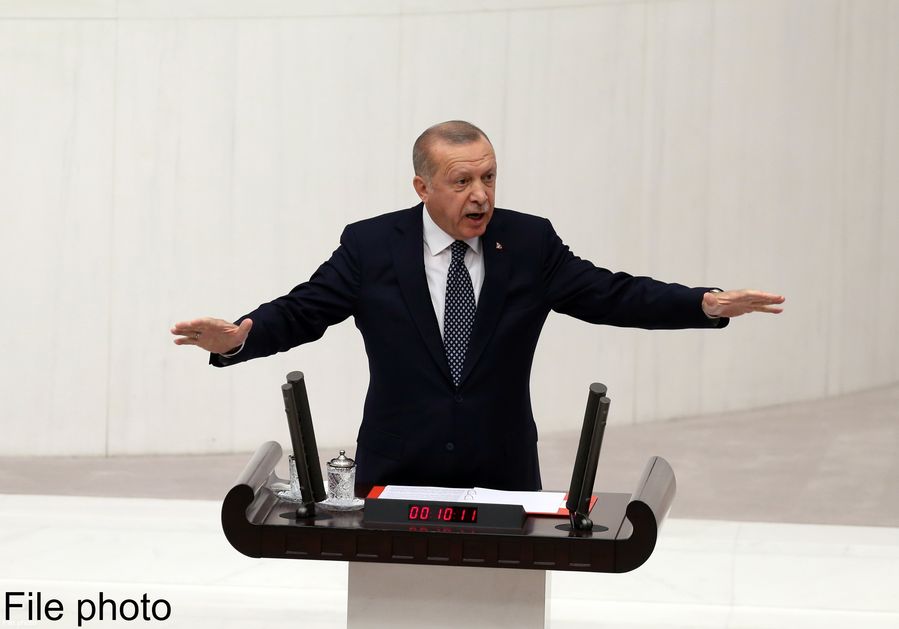
Turkish President Recep Tayyip Erdogan speaks at the opening ceremony of the new legislative year of the Turkish parliament in Ankara, Turkey, on Oct. 1, 2019. (Photo by Mustafa Kaya/Xinhua)
Turkey is likely to respond by announcing retaliatory sanctions on U.S. after Washington rolled out sanctions on Ankara.
ANKARA, Oct. 15 (Xinhua) -- As the United States on Monday rolled out a package of sanctions on Turkey over its ongoing military operations in Syria, Ankara is likely to respond by announcing retaliatory sanctions on the United States.
"Turkey will respond to it. The provision can be expected to be more military-political in addition to imposing similar prohibitions on some American ministers, which will have more symbolic meaning," Murat Yetkin, a veteran foreign policy journalist, wrote on his blog.
For example, U.S. military flights from Incirlik air base in southern Turkey, Diyarbakir air base and Batman military base to Syria can be restricted and lifted, Yetkin said.
The Turkish Foreign Ministry on Oct. 11 signaled that Ankara would retaliate by imposing any kind of sanctions on Washington due to the ongoing operation.
Elaborating the U.S. Department of Treasury's earlier statement about its preparations to enact sanctions against Turkey over Operation Peace Spring, Turkish Foreign Ministry spokesperson Hami Aksoy said that any steps in opposition to the Turkey's operation will be met with "multi-folded response in the context of full reciprocity."
Turkish Foreign Minister Mevlut Cavusoglu also indicated that any negative steps against Turkey will receive "exactly reciprocal response."
U.S. President Donald Trump on Monday signed an order authorizing sanctions against Turkey, raised tariffs on steel imports from the country, and imposed sanctions on Turkey's ministers and Ministries of Defense, Energy and Interior in response to its military operations in Syria.
These sanctions are symbolic as Trump wants to keep a balance between maintaining the U.S.-Turkey ties and the mounting domestic pressure on him due to Turkish incursion into northern Syria, Uluc Ozulker, a retired Turkish ambassador, told Xinhua.
"Trump is drawing a strategy in a way not to lose his interests in relations with Turkey. But he also faces serious problems in domestic American politics. He is calculating to move in a way with minimum losses," Ozulker said.
The announced sanctions against Turkey are not too harsh, he said, explaining that Trump only commissioned the U.S. treasury to work on sanctions on Turkish ministers and ministries.
Concerning the suspension of efforts to reach the U.S.-Turkey bilateral trade target of 100 billion U.S. dollars, Ozulker said this goal was not realistic anyway.
The former diplomat noted that the United States decided to slap sanctions on the minister and Ministry of Energy of Turkey because ExxonMobil and Noble Energy, rivals of Turkey's drilling activities in Eastern Mediterranean off the Cyprus coast, are both American.
These sanctions are unlikely to affect Turkey's military operation into Syria, according to Oytun Orhan, coordinator at the Ankara-based think tank Center for Middle Eastern Studies.
The measures are merely "face-saving" for the U.S. government and rather serve as a warning to the Turkish government, the expert said.
Yetkin also pointed out the fact that Turkish history showed whenever Turkey was put under pressure, the government did not back off from its military operations.
If Turkey is restricted in its trade with the United States, there are still other alternatives, according to Yetkin, who suggested that Russia could be one of the potential industrial partners with Turkey. ■



